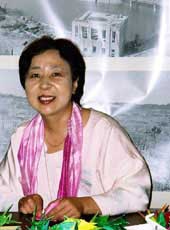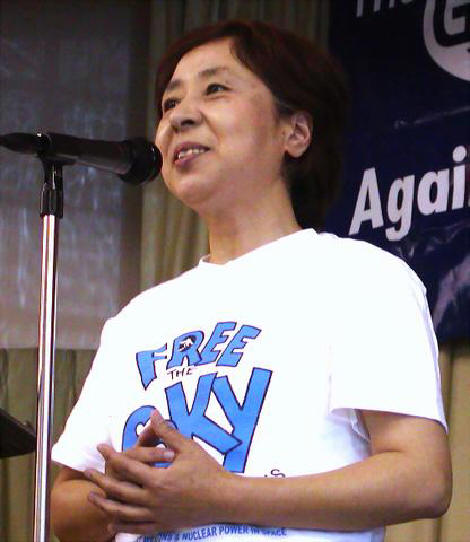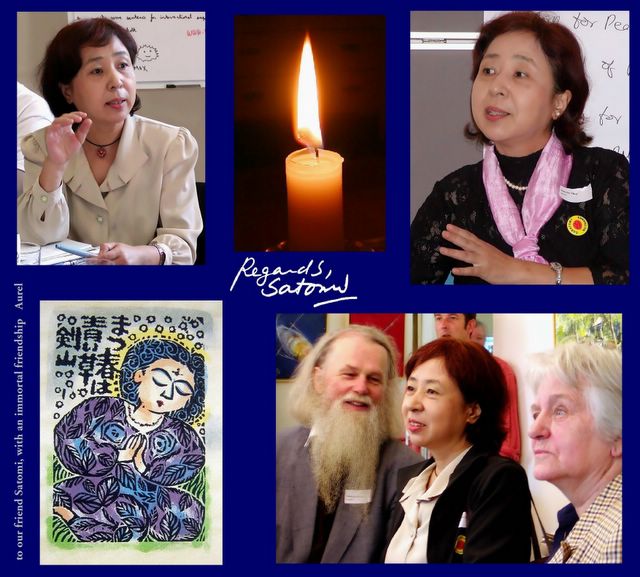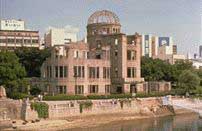|
We miss, honor
and support the work of Satomi Oba
The loss of Satomi
Oba in February 2005 was a terrible shock. This Japanese sister, link
for so many between their countries and Japan and Asia, was a dedicated
international worker for a peaceful future, mother of four, teacher,
and dear friend. She was struck down at age 54 by a cerebral hemorrhage.
Her work lives on in the many lives she has touched. The list of organizations
she was part of, and their tributes to her, reflect her untiring life's
work.
|
On Sun,
27 Feb 2005
Shuji Imamoto wrote:
Dear Green
friends,
I am deeply sorry to let you all know Ms Satomi Oba, president
of Plutonium Action Hiroshima, as well as chair member of
Abolition 2000, who acted a chairperson of peace-building
session in AP Greens Kyoto meeting, passed away on Thursday,
February 24th, around 4 pm.
She was a famous for a strong anti-nuclear activist living
in Hiroshima and very active in spreading latest situations
regarding global nuclear issues, as a coordinator of WISE
Japan. She has often joined a lot of international conferences
on anti-nuclear movement, such as NPT Conference. She has
made various actions with many friends and activists all over
the world, for many years. She has translated "Bush's Star
Wars" video and many many books and articles. The video she
edited won the Universal Peace Prize by Global Network. Her
funeral took place in Hiroshima last night, the cremation
will be the following morning. She will be throughly missed
by many people in the planet.
|
|
 |
Satomi's
work was among the first published by WLOE in our "Voices of
Women" series.
Japan
Summer 2004 (pdf format, 7 pages)
In this report Satomi Oba, a long-time anti-nuclear activist with
particular concerns for human rights and justice, presents a personal
overview of current issues in her native Japan. She discusses
nuclear weapons and power, the international campaign to halt
the militarization of space, and citizen action for peace.
The
Lie of the Peaceful Use of Nuclear Energy:
Nuclear Weapons and Nuclear Power Plants - Two Sides of the Same
Coin
European Trip Report, October 2004 (pdf format, 10 pages)
See also: Nukes
and the Japanese society (WISE Women Special, 1999)
"The nuclear system, both military or civil, is one of the
most violent ones that patriarchal society has invented and developed.
Nuclear power grows particular well in an undemocratic atmosphere..."
|
|
Satomi
Oba and Hiroshima
Satomi: "I came to Hiroshima when I was a university
student in 1969, and here I first learned about the hazards of
atomic bombs. I saw lots of photos and heard a lot of stories
from survivors. I felt it was very terrible and that we had to
stop nuclear weapons. But I also began to question the fact that
the people of Hiroshima are active against nuclear weapons but
not so active against nuclear power plants.
I started Plutonium Action Hiroshima in 1991 when the shipment
of plutonium (from French reprocessing facilities back to Japan)
was just starting. So I have been working on the plutonium issue
for about 5 years. But before this we had held some actions against
nuclear power plants, after the Chernobyl accident in 1986. That
accident was very shocking to all of us in Japan, like other parts
of the world. But I was aware of the dangers of nuclear power
in civilian and military use before the Chernobyl accident. I
started my small activity in 1983-84..."
-- "A
View From Hiroshima: Japan is Chernobyl" Anna Gyorgy
interviews Satomi Oba, Hiroshima 1996
|
|
|




